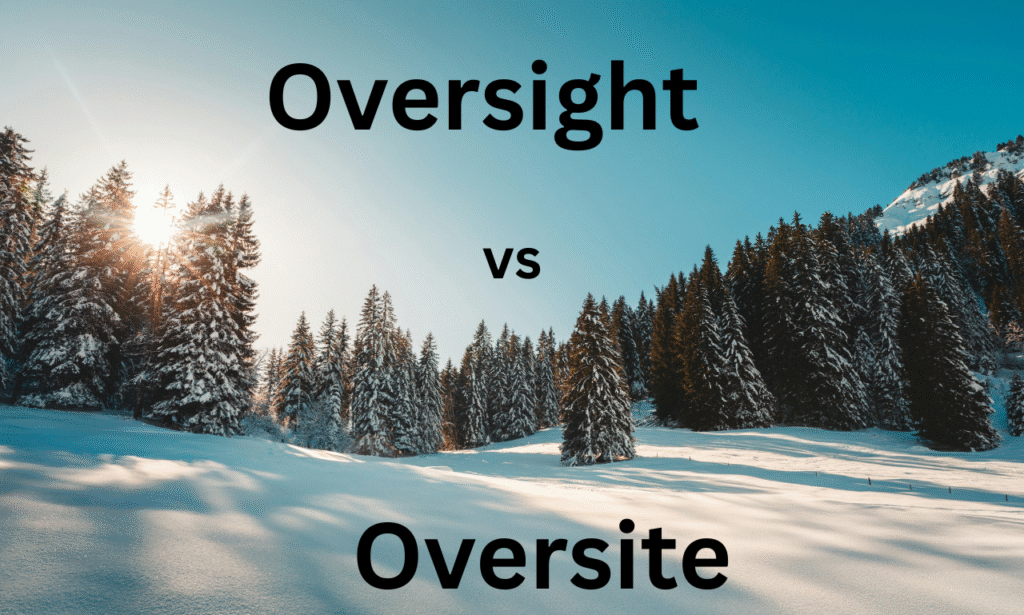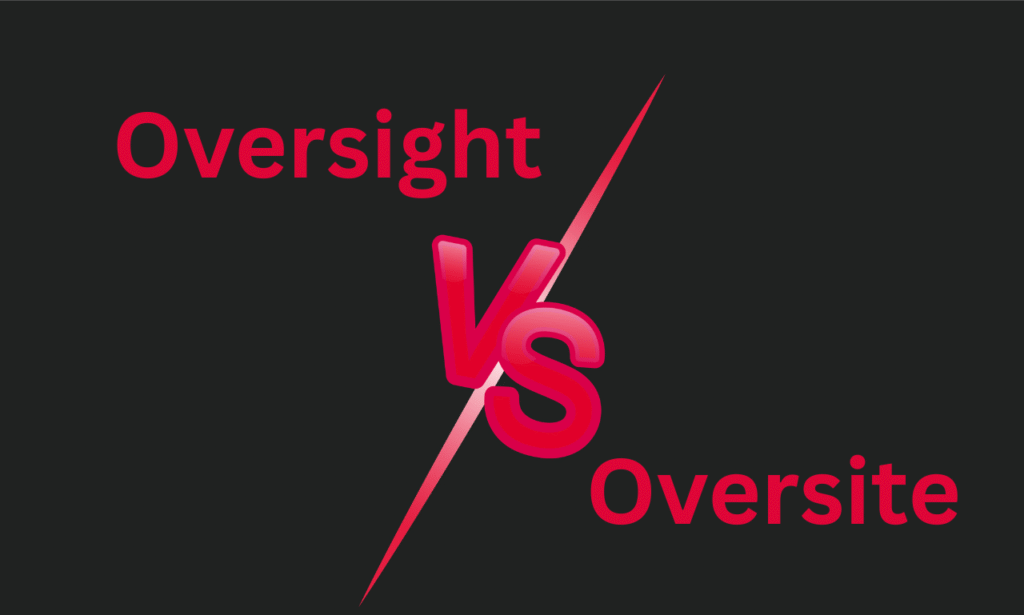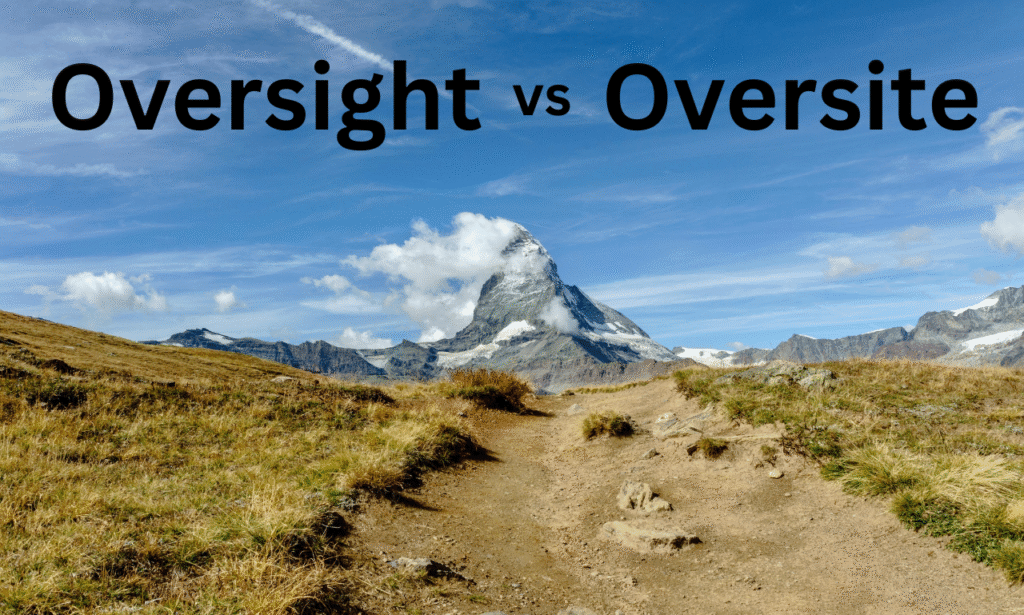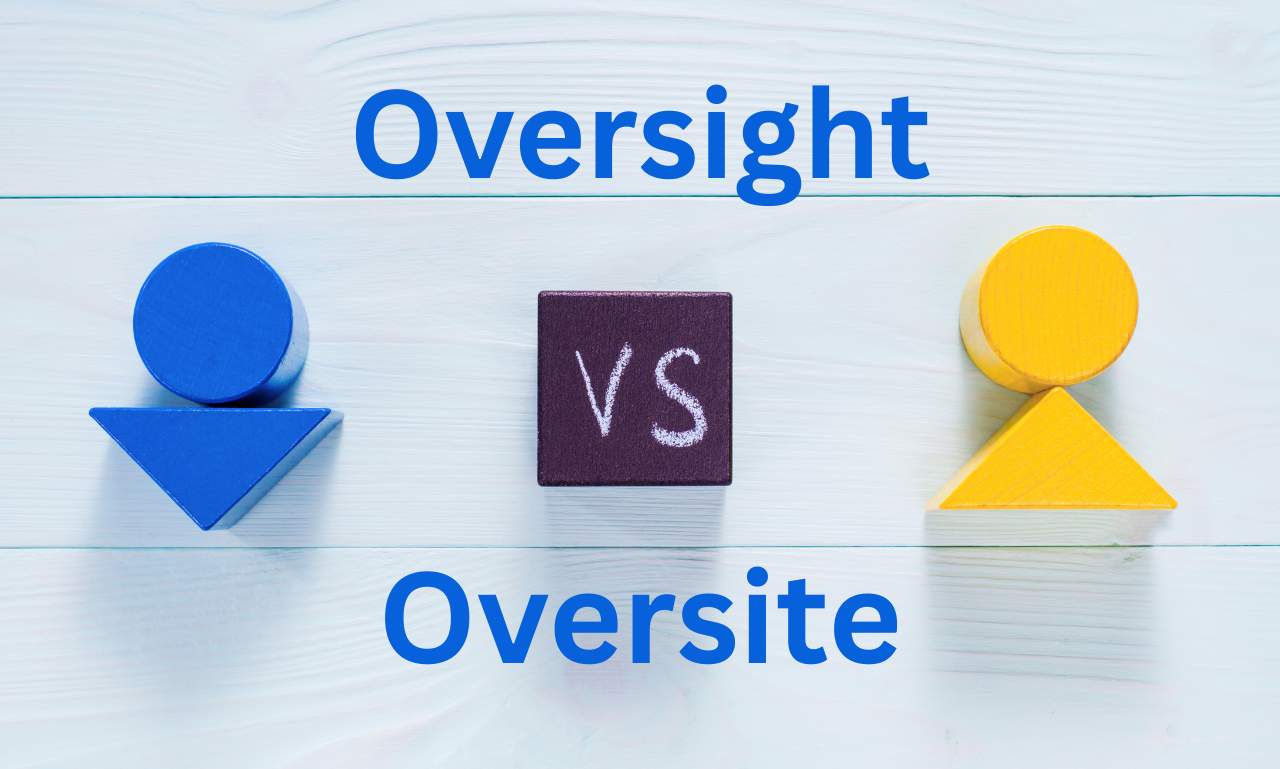When you drop into the nuances of “Oversight” vs”Oversite,” it’s fascinating to see how a single letter can alter meaning dramatically. Oversight refers to the act of supervising or managing something, often with an implication of responsibility and accountability.
Think of it as the safety net that ensures projects stay on track and adhere to regulations. For instance, in corporate governance, oversight is crucial for maintaining ethical standards and ensuring that everything runs smoothly.

What is Oversight?
Oversight is often misunderstood, but at its core, it serves as a vital mechanism for accountability and governance in various sectors. It involves the supervision and evaluation of processes to ensure that operations align with established standards and regulations.
Words like shield that helps organizations maintain integrity, transparency, and ethical practices. In a world where complex systems govern everything from corporate entities to governmental functions, effective oversight can make all the difference between success and failure.
Definition and Usage of Oversight
Oversight, often confused with “oversite,” refers to the process of monitoring and supervising activities to ensure compliance, accountability, and effective management.
This concept is crucial in various fields, from corporate governance to public policy, as it helps maintain transparency and integrity. By implementing oversight mechanisms, organizations can prevent mismanagement and corruption, fostering a culture of trust and responsibility among stakeholders.
Synonyms for Oversight
When we talk about “oversight,” many might envision a watchful eye or supervision, but the term can also imply a slip-up or error. This duality opens up a rich vocabulary of synonyms that can add depth to your communication.
Words like “supervision,” “management,” and “monitoring” capture the essence of oversight in terms of guidance and control. However, if you’re leaning towards the idea of an unintentional mistake, terms such as “omission,” “neglect,” or “lapse” might resonate more with your message.

Common Scenarios for Oversight in Professional Writing
In the world of professional writing, the subtle distinctions between terms can lead to significant oversights. For instance, many writers often confuse “Oversight” with “Oversite,” the latter being a common misspelling.
This confusion can impact not only clarity but also credibility. When readers encounter such errors, they may question the writer’s attention to detail or expertise in their subject matter, which can diminish trust and engagement.
define oversite
Oversite is often mistaken for oversight, but the two terms carry distinct meanings that are worth exploring. Oversite refers to the act of overlooking or neglecting something, whether intentionally or unintentionally.
It can manifest in various contexts, from minor errors in everyday tasks to significant lapses in judgment in professional settings. This subtle distinction highlights how our actions (or inactions) can lead to unintended consequences, reminding us that attention to detail is crucial in both personal and professional spheres.
Definition and Usage of Oversite
Oversite, often confused with oversight, refers to a specific type of monitoring or supervision that ensures processes run smoothly and effectively.
While oversight typically implies a broader scope of responsibility, such as governance or management, Oversite hones in on the finer details. This distinction is crucial in various fields, from project management to compliance, where understanding the nuances can significantly impact outcomes.
Synonyms and Related Terms for Oversite
When discussing “oversite,” it’s essential to clarify that this term is often confused with “Oversight.” While “oversite” refers to the act of overseeing or supervising, “oversight” encompasses a broader scope, including both the act of monitoring and the potential for unintentional omissions.
This distinction opens up a rich vocabulary for exploring related terms. Words like “supervision,” “management,” and “regulation” reflect the proactive aspect of oversight, emphasizing the importance of guidance in various fields, from corporate governance to project management.
Oversight or Oversite: Key Differences
When diving into the nuances of “oversight” and “oversite,” it’s fascinating to see how a simple letter can create a world of difference. Oversight, with its emphasis on supervision and management, plays a crucial role in ensuring that processes run smoothly and ethically.
Think of it as the safety net that catches potential errors before they spiral out of control. This concept is vital in industries ranging from finance to healthcare, where careful monitoring can mean the difference between success and disaster.

Situational Examples to Clarify Key Differences
For Example Imagine you’re at a bustling café where the barista is meticulously crafting your latte. This scene perfectly illustrates the concept of oversight, where someone is actively supervising the process to ensure everything runs smoothly.
Here, the barista’s careful attention ensures that each cup meets a certain standard, reflecting the essence of oversight , active management and guidance in various situations, whether in projects or daily operations.
Why Knowing the Difference is Important?
Understanding the difference between “Oversight” and “Oversite” is crucial, especially in professional settings. Oversight refers to the act of supervising or monitoring activities, ensuring that everything runs smoothly and adheres to established standards.
It plays a vital role in governance, project management, and compliance, as effective oversight can prevent costly mistakes and enhance accountability. On the other hand, “oversite” is a less common term that generally refers to the physical location or site where an activity occurs. While it might seem trivial, confusing these terms can lead to miscommunication, affecting everything from project planning to legal documents.
Tips for Remembering the Difference Between Oversite vs Oversight
When it comes to remembering the difference between “Oversight” and “Oversite,” a helpful trick is to focus on their meanings and applications. “Oversight” refers to supervision or the act of overseeing something, like a project or team.
You can associate it with the word “sight,” as in keeping your eyes on something important. Imagine yourself watching over a garden, ensuring everything is growing as it should; that’s oversight in action!
Practical Tips to Avoid Confusion
Confusion often stems from subtle differences in language, like the common mixup between To avoid such pitfalls, consider keeping a personal glossary of fre“Oversight” and “Oversite.”quently confused words.
Whenever you encounter a term that gives you pause, jot it down along with its definition and examples of usage. This not only reinforces your understanding but also serves as a handy reference that can save you from potential misunderstandings.
Everyday Usage Examples
The difference between “Oversight” and “Oversite” can seem trivial, but it plays a vital role in everyday communication. For instance, consider a project manager discussing the final stages of a project.
They might say, “Due to oversight on my part, we missed that crucial deadline.” Here, they’re referring to an unintentional mistake or oversight in their planning process. Conversely, if someone mentions an “oversite,” they could be mistakenly suggesting a physical location or platform, which could lead to confusion in a conversation about logistics or site management.
Avoiding Common Mistakes with Oversite vs Oversight
One common pitfall is using “Oversite” when you mean “Oversight,” particularly in professional settings. This can undermine your credibility, especially in documents where precision is paramount. To avoid this mistake, it’s helpful to remember that oversight relates to monitoring and mistakes, while oversite implies a protective layer.
By taking a moment to consider the context of your message, you can ensure clarity and enhance your writing’s effectiveness. Embracing these distinctions not only boosts your confidence but also enriches your interactions in both personal and professional realms.
Conclusion
In short, understanding the difference between “Oversight” and “Oversite” is crucial for effective communication. While “Oversight” refers to the act of supervising or managing something, “Oversite” is often a common misspelling that can lead to confusion.
Recognizing these distinctions not only enhances our language skills but also ensures that we convey our ideas clearly. Whether you’re writing a report or simply chatting with friends, using the correct term can make a big difference. So, next time you’re faced with these words, remember to choose wisely!
FAQs
What is the meaning of oversite?
It looks like there might be a little mixup with the word “oversite.” If you meant “oversight,” it generally refers to the act of overseeing or monitoring something, ensuring that everything is done correctly and according to plan.
For example, a manager might have oversight over a project, making sure that the team is meeting deadlines and following guidelines.
What does it mean by an oversight?
An oversight typically refers to a mistake or an error that occurs due to someone not paying enough attention or missing something important. It can happen in various contexts, whether in work, personal life, or even while managing projects.
For example, if someone forgets to include a crucial detail in a report or overlooks a deadline, that’s considered an oversight.
What is a synonym for oversite?
It seems like you might be looking for a synonym for “oversight.” If that’s the case, some good alternatives include “supervision,” “monitoring,” or “management.” Each of these words captures the idea of keeping an eye on something to ensure everything is running smoothly.

